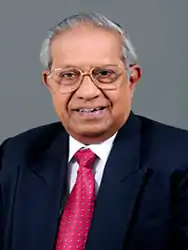Sivapatham Vittal
Sivapatham Vittal is an Indian surgical endocrinologist, considered by many as the Father of Surgical Endocrinology in India.[1][2][3][4] The Government of India honored Vittal in 2011, with the fourth highest civilian award of Padma Shri.[5][6]
Sivapatham Vittal | |
|---|---|
 | |
| Born | 30 April 1941 Chennai, India |
| Occupation | Surgical endocrinologist |
| Awards | Padma Shri Dr. B. C. Roy Award Tamil Nadu Scientist Award Dr B M Sundaravadanam Best Teacher Award Royal College of Surgeons of Edinburgh Gold Medal Teachers' Teacher Award MMC Lifetime Achievement Award Human Excellence Award |
He is a Member, Board of Trustees of the Ethiraj College for Women, Chennai.
Biography
Sivapatham Vittal was born on 30 April 1941 and graduated in medicine from Madras Medical College from where he also obtained his post graduate degree.[2] Joining his alma mater as a faculty member, he is reported to have been instrumental in establishing the Department of Endocrinology at Madras Medical College in 1987, known to be the first such department in India[1] and was its first head of the department, a post he held till 1999.[7][1]
Vittal, the founder president of the Indian Association of Endocrine Surgeons, is a former president of the Association of Surgeons of India and the International College of Surgeons, India chapter.[2][1][3] He has served as the surgical tutor at the Royal College of Surgeons of Edinburgh and has held the chair of its India chapter.[2][1][3] He is also a member of the British Association of Endocrine and Thyroid Surgeons[2][1][3] and the International Medical Sciences Academy.[3] He is credited with a book and articles on Endocrinology[8] and has been a member of the editorial boards of journals such as Indian Journal of Surgery, Thyroid Surgery, International Surgery.[1] He has also delivered key note addresses at several conferences and seminars and has served as the visiting professor at many universities.[3]
An Emeritus Professor of the Tamil Nadu Dr. M.G.R. Medical University,[4] Sivapatham Vittal, post his retirement from Madras Medical College, is associated with the Apollo Hospitals, Chennai as an endocrine surgeon.[4][3] He is also one of the founders of Sree Sai Krishna Hospital, Chennai.[3] He is a Fellow of the Royal College of Surgeons of Edinburgh, and the International College of Surgeons, the International Medical Sciences Academy.[4]
He is a Member, Board of Trustees of the Ethiraj College for Women, Chennai.
Awards and recognitions
Sivapatham Vittal is a recipient of the 1995 Dr. B. C. Roy Award, the highest Indian award in the medical category.[2][4][3][1] Two years later, the Royal College of Surgeons of Edinburgh honored him with the Silver Medallion and the next year, in 1998, the Government of Tamil Nadu awarded him the Tamil Nadu Scientist Award.[2][4][3] In 2001, he received the Human Excellence Award from the Vivekananda Institute of Human Excellence.[4][3]
The Association of Surgeons of India conferred Dr B M Sundaravadanam Best Teacher Award on Vittal in 2005,[2] and the same year he received the Overseas Gold medal from the Royal College of Surgeons of Edinburgh.[2][4][3][1] The Teachers' Teacher Award reached him in 2007[2] and Madras Medical College awarded the Lifetime Achievement Award from Madras Medical College in 2010.[2][1] The next year, the Government of India included Vittal in the Republic day honours list for the award of Padma Shri.[4][2][5]
References
- "The Hindu". The Hindu. 3 April 2011. Retrieved 25 November 2014.
- "Profile". DRSVittal.com. 2014. Retrieved 25 November 2014.
- "Sree Sai Krishna". Sree Sai Krishna. 2014. Retrieved 25 November 2014.
- "My Doc Advisor". My Doc Advisor. 2014. Retrieved 25 November 2014.
- "Padma Shri" (PDF). Padma Shri. 2014. Retrieved 11 November 2014.
- "Indian Express". Indian Express. 26 January 2011. Retrieved 25 November 2014.
- "Thyroid Clinic" (PDF). Thyroid Clinic. 2014. Retrieved 25 November 2014.
- Sivapatham Vittal (August 2011). "Evolution of Endocrine Surgery in India". Indian J Surg. 73 (4): 243–244. doi:10.1007/s12262-011-0291-9. PMC 3144349. PMID 22851834.
Further reading
- Sivapatham Vittal (August 2011). "Evolution of Endocrine Surgery in India". Indian J Surg. 73 (4): 243–244. doi:10.1007/s12262-011-0291-9. PMC 3144349. PMID 22851834.